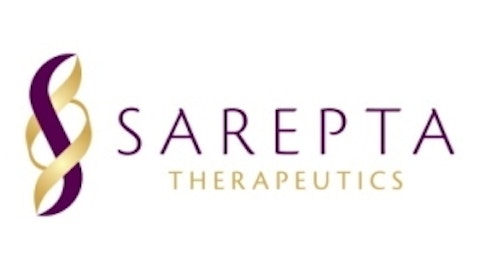Fair Valuations As Compared to Peers:
On a relative basis, GlaxoSmithKline plc (ADR) (NYSE:GSK) is trading at PE of 19, compared to Johnson & Johnson (NYSE:JNJ) and Merck & Co., Inc. (NYSE:MRK), which are trading at a PE of 25 and 24, respectively. In terms of PEG valuation, GlaxoSmithKline plc (ADR) (NYSE:GSK) is trading at a PEG of 2.3, which is lower than peers as shown in the table below. Further, the company is trading at a price to sales ratio of 3.2, which is again relatively less than peers. GlaxoSmithKline plc (ADR) (NYSE:GSK)’s current dividend yield is 4.2% compared to Johnson & Johnson (NYSE:JNJ)’s 2.9% and Merck & Co., Inc. (NYSE:MRK)’s 3.6%, making it lucrative for investors.
| Company | Earnings | PE | PEG | P/S |
|---|---|---|---|---|
| GSK | 8.2 | 19.2 | 2.3 | 3.2 |
| JNJ | 6.6 | 25.1 | 3.8 | 3.8 |
| MRK | 7.1 | 24.3 | 3.4 | 3.2 |
Drugs in pipeline
GlaxoSmithKline plc (ADR) (NYSE:GSK)’s near-term growth potential relies on Breo, the company’s new treatment for the respiratory disease COPD, and skin cancer drugs Tafinlar and Mekinist, which have received U.S approval. There are three more drugs, which according to the company will receive approval by the end of the year. Thirteen more products are in late stage clinical trials, whose results are expected in next eighteen months. An increased number of approvals is what the company is aiming at, as it is the revenue driver for any pharmaceutical company.
Comparative analysis
Johnson & Johnson can make major advances in care and provide a treatment where no adequate therapy exists. Johnson & Johnson is in $1 billion deal with Aragon Pharmaceutical for its prostate cancer drug ARN-509. A similar move in 2009 for Zytigia treatment was a blockbuster in two years time. It is expected that with the development of ARN-509, it could make a market more than Zytigia.
But recent news in India has left a sour taste for investors. The company has been reported to use ethylene oxide; a substance which is used to sterilize medical equipments, to kill bacteria in baby powder. Even after that, JNJ has not conducted mandatory tests to make sure that no traces of the substance were left as it is a cancer causing agent.
Merck financials show 9% decline in total sales with pharmaceutical decline of 12% in the fiscal 2012. Singulair, which was company’s second largest selling drug globally, saw its patent expire in the U.S in August 2012, leading to a 75% decline in sales. The patent has also expired in number of other European countries further affecting the company’s revenue.
Maxalt too lost its protection in December 2012 in the U.S, and it will continue to lose its market share in many of the European countries as the patent will expire by August.
Another problem associated with Merck is the ongoing case over the painkiller Vioxx. The painkiller was promoted as a treatment of rheumatoid arthritis, but the drug has shown substantial evidence of heart attacks. The drug was pulled out of the market, yet the company is facing its consequences. Merck has already paid $4.85 billion to resolve the lawsuits. This is not the end as Merck has further paid $950 million as a part of criminal fee and has agreed to pay $220 million against consumer fraud lawsuits.
The bottom line
Fair valuations, good financials and a large number of drugs in pipeline surely do not give a bearish outlook to this stock for the long-term. China’s issue might have some short term impact on the company’s price but this will be offset by the company’s strong performance. Overall, investors can consider exposure to the stock for a healthy dividend yield associated with robust earnings growth.
Dividend stocks can make you rich. It’s as simple as that. While they don’t garner the notoriety of high-flying growth stocks, they’re also less likely to crash and burn. And over the long term, the compounding effect of the quarterly payouts, as well as their growth, adds up faster than most investors imagine.
The article 3 Reasons GlaxoSmithKline Will Survive the China Scandal originally appeared on Fool.com.
Anjum Khan has no position in any stocks mentioned. The Motley Fool recommends Johnson & Johnson. The Motley Fool owns shares of Johnson & Johnson. Anjum is a member of The Motley Fool Blog Network — entries represent the personal opinion of the blogger and are not formally edited.
Copyright © 1995 – 2013 The Motley Fool, LLC. All rights reserved. The Motley Fool has a disclosure policy.




